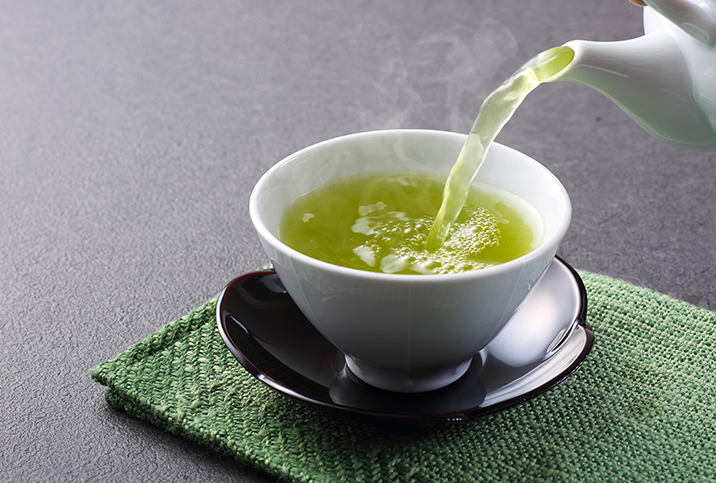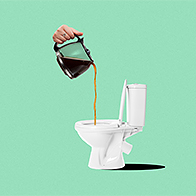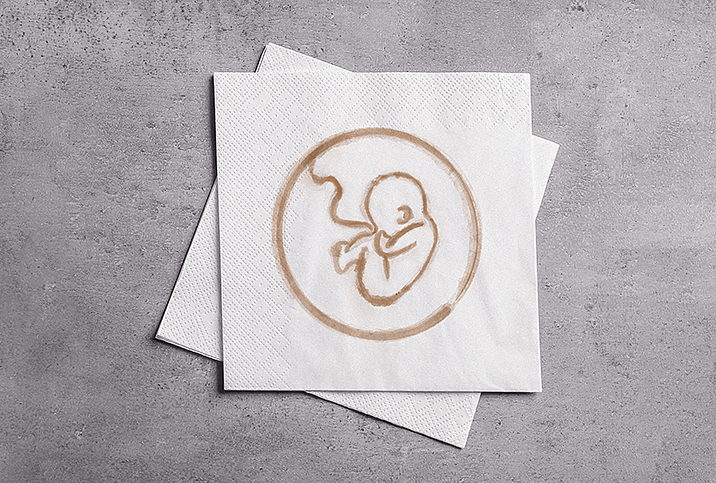Exploring the Connection Between Green Tea and Lower Cancer Risk

Green tea is a widely popular drink due to its antioxidant properties. Purported health benefits include fat loss, boosted brain function and decreased risk of heart disease and cancer.
The medicinal properties of green tea come from its powerful health compounds:
- Polyphenols help to reduce inflammation and fight cancer.
- A catechin called epigallocatechin-3-gallate (EGCG) is a natural antioxidant that—among other health benefits—aids the prevention of cell damage.
- Essential minerals.
By protecting cells and molecules, these substances can decrease the development of free radicals, which can impact aging and various diseases.
"Green tea is rich in polyphenols, which have been shown to have a wide range of health benefits, including anti-inflammatory, antibacterial, neuroprotective and cholesterol-lowering effects," confirmed Kelly McCabe, a dietitian who works with cancer patients and co-founded Perci Health in London.
Adding a cup of tea to your daily routine could be beneficial to your overall health and maybe even reduce your risk of cancer. However, adding milk to your tea might lower its antioxidant capabilities, according to a 2010 study published in Nutrition Research.
Can green tea really lower cancer risk?
Cancer is caused by changes in DNA via the uncontrolled growth of cells. Oxidative damage can cause chronic inflammation, which can lead to chronic diseases, including cancer. Antioxidants can help prevent oxidative damage.
"Green tea is commonly consumed in East Asian countries, such as China and Japan, but its popularity is increasing globally, partly due to the many health claims associated with drinking green tea, such as a lower risk of cardiovascular diseases, dementia and certain types of cancer," McCabe said.
McCabe admitted, however, that the verification to support these claims is inconsistent. While more research is needed, drinking green tea isn't going to hurt.
"There is no evidence that drinking tea of any kind causes harm, so people can carry on drinking tea as a regular part of a healthy balanced diet," she said.
She pointed out that green tea does contain caffeine, therefore, it's not a good replacement for coffee or black tea if someone is looking to restrict their caffeine intake. McCabe also suggested that it's best to drink green tea earlier in the day to avoid sleep disturbance.
What do the studies say?
Given the nature of cancer development and all of the advantages of green tea, scientists have been researching how green tea consumption affects breast and other cancer risk for decades.
One epidemiological study surveyed 8,552 individuals older than age 40 about their lifestyle habits, including green tea consumption, and suggested that green tea has "a potentially preventive effect against cancer among humans." The study was followed up for nine years, during which 384 cases of cancer were identified.
The survey results suggested that among females who had consumed more than 10 cups a day, there was a slowdown in the rise of cancer incidence with age, along with a significantly lower age-standardized average annual incidence rate.
It is important to note that this study looked only at Japanese women, whose lifestyle and dietary habits are quite different from other cultures. Therefore, the results may not be generalized for other women.
While many observational studies have shown positive outcomes of green tea lowering breast cancer risks, high-quality research is yet to confirm these effects as the association remains unclear based on the current evidence.
A 2019 meta-analysis of 14 studies (12 in Asia, two in the United States), published between 2002 and 2016, included more than 14,000 women with breast cancer and over 15,000 control subjects and analyzed participants based on their habit of drinking green tea. While the analysis showed a reduced incidence of breast cancer in women who drank green tea, the results aren't exactly conclusive.
"There were a lot of details missing; some of the studies were small, and there was no long-term follow-up," said Tara Scott M.D., an OB-GYN and medical director at Summa Health Systems in Akron, Ohio.
Looking at our physiology, it does make sense how green tea could decrease breast cancer risks, Scott said.
"The active component of green tea, EGCG, acts to inhibit the enzyme aromatase. This enzyme converts testosterone to estradiol and is the same place that hormonal therapy for breast cancer, [such as] Arimidex or anastrazole, works. This would prevent estrogen from being formed in a postmenopausal woman," she explained, adding that estrogen is generally thought to stimulate the breast cancer cell.
"Secondly, caffeine actually helps speed up phase one of estrogen detox. Estrogen detoxification occurs in the liver and is generally two phases. If this does not happen efficiently, it can result in higher levels of estrogen, which may influence the incidence of breast cancer. Caffeine stimulates both cytochrome P450 1A1 and 3A4, which are both part of phase one," Scott said.
Green tea can also improve glucose metabolism, she said.
"Having high sugar is not good for a cancer patient," Scott said. "Diabetes is often listed as a risk factor for certain cancers."
Scott emphasized, however, that for breast cancer patients, there is no accepted recommendation to either increase green tea consumption or take an EGCG supplement.
"In the integrative medicine world, we may consider this recommendation among other integrative approaches for patients at risk for breast cancer," she concluded.




















